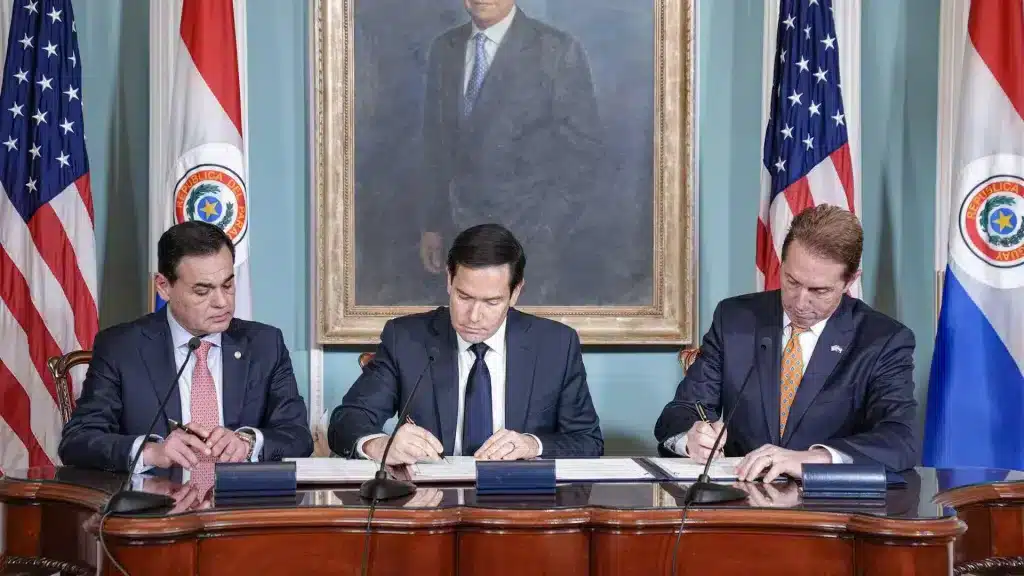
Paraguay's Foreign Minister Ruben Ramirez Lezcano (left), US Secretary of State Marco Rubio (center), and US Deputy Department of Homeland Security Secretary Troy Edgar (right) sign a memorandum of understanding. Photo: X/@SecRubio.

Orinoco Tribune – News and opinion pieces about Venezuela and beyond
From Venezuela and made by Venezuelan Chavistas

Paraguay's Foreign Minister Ruben Ramirez Lezcano (left), US Secretary of State Marco Rubio (center), and US Deputy Department of Homeland Security Secretary Troy Edgar (right) sign a memorandum of understanding. Photo: X/@SecRubio.
Paraguay is on its way to becoming a “safe third country” for the United States, receiving migrants seeking asylum from Washington, according to a memorandum of understanding signed by Paraguayan Foreign Minister Rubén Ramírez Lezcano and US Secretary of State Marco Rubio.
“Under this agreement, the United States will forward the cases of individuals requesting asylum to Paraguay. Paraguay’s National Commission for Stateless Persons and Refugees (CONARE) will evaluate each request and determine its approval or rejection in accordance with current regulations,” the Paraguayan Foreign Ministry said in a subsequent statement.
But, through his X account, Rubio made clear the level of importance the deal has for Washington: “@POTUS will no longer allow the U.S. asylum system to be abused. Today’s signing of a Safe Third Country Agreement with Paraguay allows asylum seekers in the United States to pursue their protection claims in Paraguay,” the foreign minister wrote, praising Paraguay’s collaboration “in combating illegal immigration and partnering to create a more secure hemisphere.”
‘A very serious problem of informality’
Indeed, the United States had already appealed to these types of agreements—recognized by the UN Refugee Agency (UNHCR)—with Central American countries such as Guatemala, Honduras, and El Salvador in 2019, during Donald Trump’s first administration (2017-2021), with the intention of discouraging illegal immigration to its territory. However, they were rescinded after Joe Biden took office (2021-2025).
In a conversation with Sputnik, Paraguayan international analyst Mario Paz Castaing noted that, despite the enthusiasm of Santiago Peña’s government, the specific terms of the agreement were not disclosed, nor was it made clear whether the deal will remain a “memorandum of understanding” for the time being or whether Paraguay’s “rights and obligations” with respect to these migrants have already been determined.
“This means that the US will offer protection in Paraguay to asylum seekers who could be deported. It remains to be seen what the compensation mechanisms are and how it will contribute to Paraguay’s development plans,” the expert said.
Paz Castaing emphasized that Paraguay “has always benefited from positive migration” within its territory, both from Mennonite populations and from migrants from Slavic countries who settled in rural areas of the South American country. However, the analyst expressed concern about how the new role the US is assigning to Paraguay could affect the national economy.
While he flatly ruled out “discrimination,” the expert noted that “Paraguay has a very serious problem with informality,” so it will be necessary to analyze “whether the agreements will expand those horizons of informality.” “These factors must be taken into account to determine how far (migrants) can be admitted and when they could cause problems for the country,” he warned.
For this reason, he stressed the importance of understanding the terms of a possible final agreement that would “bring down to earth” the public statements made by Rubio and Ramírez Lezcano. In this regard, he noted that the text must be approved by the Paraguayan Congress if it ultimately becomes a bilateral treaty “with rights and obligations” for the South American country.
Venezuela Welcomes 341 Migrants From US Under Return to Homeland Program
The US’s best ally in South America?
Beyond the specific agreement, the meeting between Rubio and Ramírez Lezcano was presented by the Paraguayan government as the beginning of “a new phase in the relationship with the United States,” encompassing not only the issue of immigration “but also security, trade, investment, and defense cooperation.”
For the expert consulted by this newspaper, the Peña administration has sought a clear rapprochement with the US “from the beginning.” However, he emphasized, it has not been unique, as the search for harmony with Washington has historically marked Paraguayan presidents of recent decades, including Fernando Lugo (2008-2012), the only president to oust the Colorado Party through the ballot box.
“There is a historic and very special relationship between the Paraguayan governments and Washington. I would say that Paraguay has been one of the most faithful representatives of that Western world which was very vibrant and relevant in the 20th century but is no longer the same today,” he reflected.
For this reason, the expert considered that the South American country “should be a little more pragmatic” in its international relations and not be “so willing to accept the requests or petitions made by the various US governments” in the current situation.
When contacted by Sputnik, Paraguayan foreign policy analyst Julieta Heduvan noted that the migration agreement signed in the US capital “demonstrates the Peña administration’s willingness to pursue Paraguay’s ever-increasing alignment with US policies.”
The internationalist identifies Paraguay as one of the countries “closest” to the US at this time, a position currently shared only by Javier Milei’s Argentina.
For Heduvan, this growth in the relationship does not appear to be accompanied by greater advantages for the Latin American nation. “Recently, the asymmetries in the relationship have deepened, and so far, there seems to be no sign of reversing this imbalance,” she said.
(Sputnik) by Sergio Pintado
Translation: Orinoco Tribune
OT/JB/SH
Support Groundbreaking Anti-Imperialist Journalism: Stand with Orinoco Tribune!
For 7 years, we’ve delivered unwavering truth from the Global South frontline – no corporate filters, no hidden agenda.
Last year’s impact:
• More than 250K active users demanding bold perspectives
• 280 original pieces published in 2025 alone
Fuel our truth-telling: Every contribution strengthens independent media that challenges imperialism.
Be the difference: DONATE now to keep radical journalism alive!